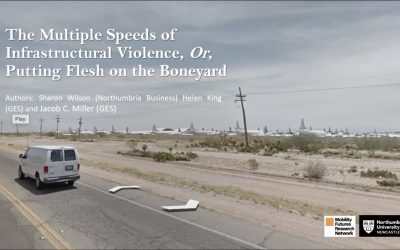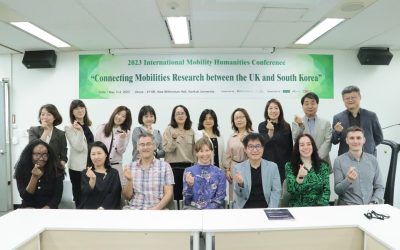CeMoRe’s 2023 Winter Webinar was co-hosted with Desert Disorders, with support from the British Academy. The webinar titled Poetry and Public Diplomacy: The Case of Western Sahara was jointly presented by Joanna Allan and Moiti Mohammed Azrouk, and chaired by...
MOBILITIES AND THE HUMANITIES
Although the ‘mobilities turn’ of the late 1990s and early 2000s was led by sociologists and geographers, it is arguable that humanities subjects such as literary and cultural studies paved the way for the sort of thinking that informed it. In particular, the post-structuralist approaches spearheaded by literary critics in the 1980s – together with development of subfields like post-colonial studies and travel writing – played a crucial role in the rise of anti-sedantarist thought. This legacy is one that both John Urry (CeMoRe Lancaster’s founding director) and Tim Cresswell acknowledge in their early work, but until recently scholars from disciplines such as English and History have been slow to engage with mobilities research post ‘the turn’ (see Merriman and Pearce, introduction to ‘Mobility and the Humanities’ special issue, Mobilities, 2017, Vol.12.4).
This began to change in 2010 with the launch of the journal Transfers (https://www.berghahnjournals.com) with its explicit focus on interdisciplinarity and the visual arts as well as a commitment to expand the reach of mobilities scholarship to the Global South. Meanwhile, in 2014 CeMoRe hosted a colloquium – led by Peter Merriman and Lynne Pearce – on ‘Mobilities and the Humanities’ which subsequently gave rise to the special issue cited above. This appears to have been another key turning point in the expansion of mobilities studies.
In 2017/18 Palgrave Macmillan USA launched a new book series entitled Studies in Mobilities, Literature and Culture (https://www.palgrave.com) edited by Marian Aguiar, Charlotte Mathieson and Lynne Pearce which has now published 10 volumes with several more in the pipeline. Around the same time, two international centres dedicated specifically to the study of mobilities and the humanities were established: the Academy of Mobility Humanities [AMH] at the University of Konkuk (South Korea) (https://www.mobilityhumanities.com) and the Centre for Advanced Studies in Mobility Humanities at the University of Padua [MoHu] (Italy) (https://www.mobilityandhumanities.it). CeMoRe is delighted to have formal partnerships with both these centres with whom they have organised several joint events in recent years. In addition, another partner – the University of Sao Paulo (Brazil) – has taken their mobilities research and teaching in a more humanistic direction via the success of their tourism programmes (https://www.each.usp.br).
For those seeking to engender low carbon ways of life, this humanist lens, has provided important new insights into our relationship with transport of different kinds – be this cycling, driving, train or air travel. In particular humanities subjects have succeeded in bringing new depth and complexity to mobilities thinking through their focus on the ways in which the individual (yet social) subject experiences and performs mobility. For example, understandings of the micro-mobilities of everyday life and the role that mobility plays in the production and sustenance of intimate relationships have been developed by literary scholars and geographers with interests in embodiment and emotion. Engagement with textual materials has provided insights into the psychology of the mobile subject including the crucial role memory plays in mediating our mobile engagement with the spatial world. In this way, mobilities – approached via the humanities – can inform and supplement the work long undertaken by social scientists working in the field in novel and sometimes surprising ways.
At CeMoRe, the expansion of mobilities theories and methods into humanities disciplines has positively impacted upon the variety of visitors we now welcome to the Centre. We invite prospective visitors working on a mobilities-related topic within the humanities or social sciences (e.g. literary and cultural studies, history, anthropology, geography, sociology, politics) to get in touch with Lynne Pearce (Co-Director, Mobilities and the Humanities) and Nicola Spurling (Director), including any post-doctoral students who are interested in working with us.
Anyone at Lancaster or beyond who would like to learn about the sort of work that is conducted in this subfield, or who would like to attend our events, is very welcome to get in touch with Lynne Pearce (Co-Director, Mobilities and the Humanities).



HUMANITIES POSTS
Summer Seminar with Dr Sharon Wilson: Putting Flesh on the Boneyard
Putting “Flesh on the Boneyard”; everyday militaries and museum, a mobilities perspective. On 25th May 2023, CeMoRe was delighted to host Dr Sharon Wilson at an in-person event on Lancaster University campus. Dr Wilson discussed her recent work that aims to “put flesh...
Connecting Mobilities Research between the UK and South Korea
On the 3rd and 4th May, two of our CeMoRe directors Dr Nicola Spurling and Dr David Tyfield; CeMoRe PhD student Harriet Phipps, and two bursary winners Dr Simon Cook, Birmingham University and PhD student Nenna Orie Chuku, University College London visited Konkuk...



